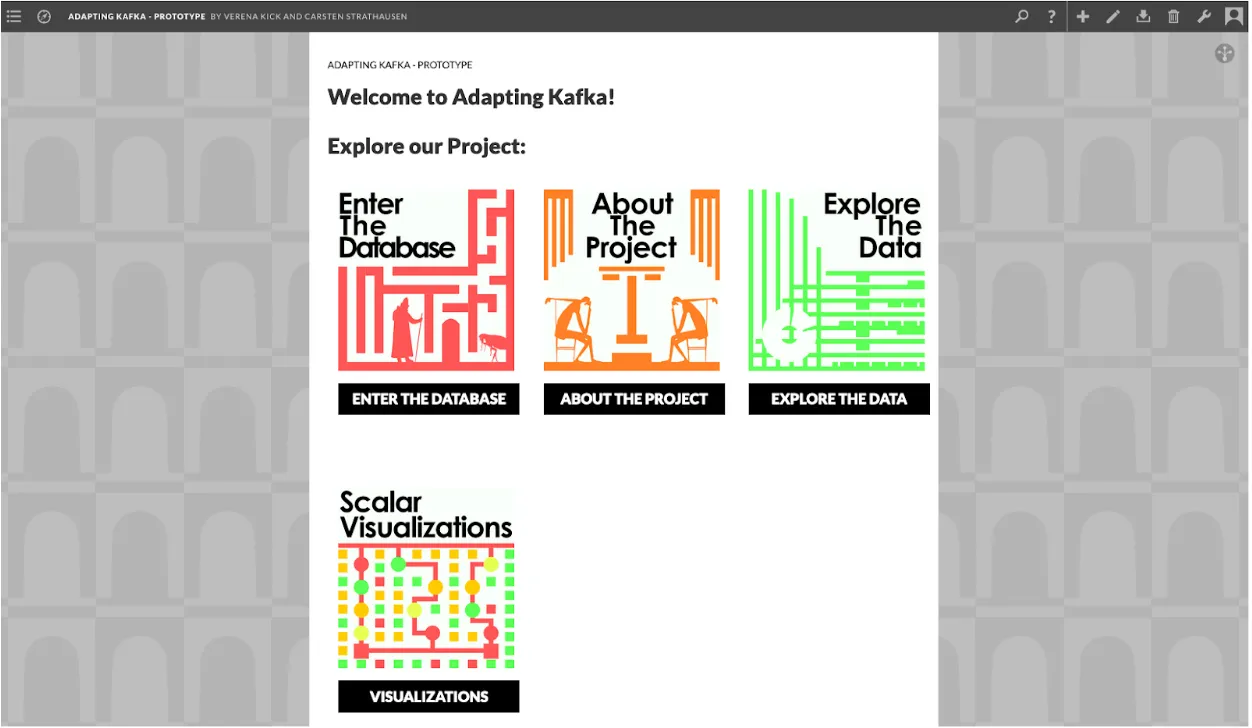Verena Kick and her Co-PI, Carsten Strathausen (University of Missouri) use Scalar hosted on GU Domains to compile and analyze all editions, translations, and adaptations of Franz Kafka’s The Trial to make scholarly resources more accessible and to offer scholarly analyses that take on a multimodal and creative form.
Verena Kick (German) and Carsten Strathausen (University of Missouri) are developing a project called Adapting Kafka, an interactive database and website that catalogs numerous editions, translations, and adaptations of Franz Kafka’s novel The Trial. Since its publication in 1925, the novel has been adapted into a variety of forms, including theater productions, feature films, art installations, audiobooks, operas, graphic novels, and standalone artworks. The project and its database, which draws on various library catalogs and resources such as WorldCat and the German Literature Archive (DLA), aims to provide a searchable platform equipped with visual tools to explore these adaptations, as well as original quantitative statistical data and qualitative scholarly analysis of them.
Professor Kick and Co-PI Carsten Strauthausen began with an idea to trace all adaptations of The Trial and investigate the connections and differences between them. They used support made available through the Digital Research and Innovation program to bring it to life—first the project’s initial database, and eventually also a prototype of the website on Scalar.
“It can be really daunting to have an idea, but not know what tools, what platform to use? Who to even ask and then to have the library team, the CNDLS team there.”
Using the online publishing platform Scalar, the project encourages innovative scholarship by allowing scholars to work with media-rich content, such as images and videos, creating arguments that are less text-based and more visually oriented. To begin building out the project, the Digital Scholarship team at the Library provided expertise on bibliographical and data analysis tools such as MarcEdit, Google Refine, OCLC Connection to build the database that informs the Adapting Kafka Scalar site.

While continuing to build the database, Kick and her team developed a working prototype of the Adapting Kafka site which she plans to incorporate into her graduate-level classes once the platform is fully functional. The DRI experience enhanced Kick’s understanding of available research resources and the importance of metadata librarians. She said she not only gained knowledge in web hosting and digital platforms, but also the range of support available to faculty at Georgetown. Because this research project required project management and learning to delegate, she experienced firsthand the value of collaborative scholarship. Kick reflected that the benefits of working with a team and receiving input from various experts encouraged her—and she encourages others— to not shy away from digital projects.
The project culminates in the Digital Kafka International Symposium to engage with fellow Kafka scholars, planned for November 1-2, 2024. Kick also wants to seek funding from the National Endowment for the Humanities (NEH) to transition the prototype into a publicly accessible scholarly resource.
Reflecting on the project, Kick noted, “It may not be finalized by the end of the 6 months or a year of support. But hey, you got something off the ground–you got started, and you will actually learn something as you’re doing it. So it’s not so much about the product. But the process.” As her work with this project continues, she plans to integrate this rich resource into her teaching, providing students with hands-on experience in scholarly writing and digital humanities projects.
The Digital Research and Innovation (DRI) program is a partnership between CNDLS and Georgetown University Library.
Back to top arrow_upward